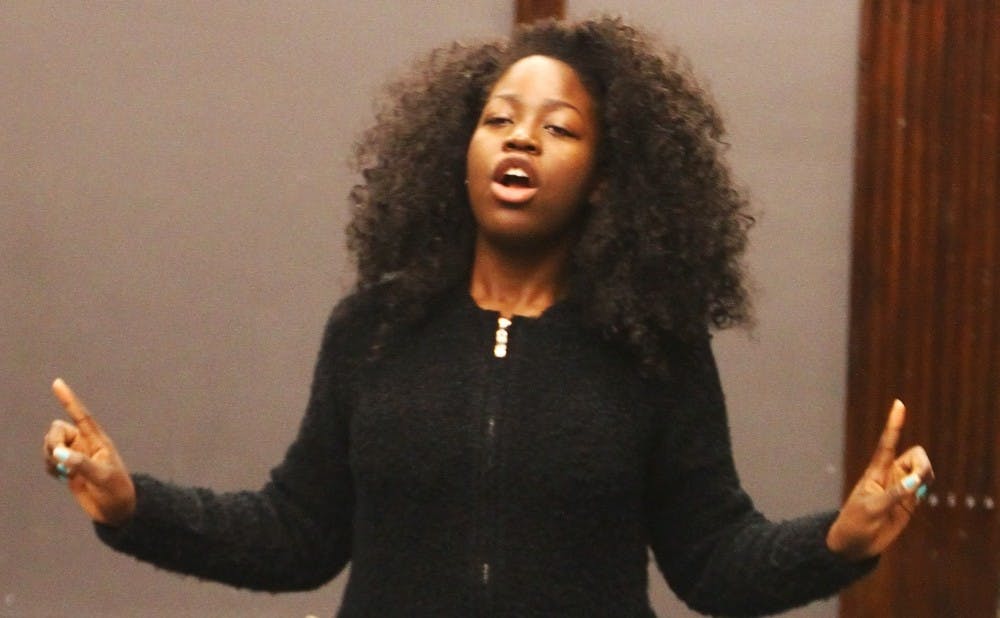“Where is your voice in the dialogue surrounding sexuality, academics, joy, effortless perfection, friendship, race, family, privilege, hardship and whatever else impacts your life? Where is your voice to describe the complex humanity behind the female Duke student, staff or faculty member?”
This Friday through Sunday, All of the Above will ask this question of Duke audiences in its 11th annual production. All of the Above, an all-female written, acted and directed show, stemmed from the 2003 Women’s Initiative steered by past president, Nan Keohane. Of the many projects born out of the initiative, All of the Above was specifically created to showcase the variety of women’s experiences on campus and to provide a platform for women’s stories.
The production brings together women through many different creative capacities in order to create a forum for their stories. Duke women write and submit the monologues anonymously, which are then read and selected by the production team. Other women can audition to perform these monologues as part of the annual spring production.
“We tried really hard this year to have a much more diverse selection of pieces and pieces that could speak to different people on campus,” said junior Cesi Bosch, former actor and current assistant director.
She further stated that the production has been criticized in the past for portraying a narrow set of women’s experiences, especially that of white, heterosexual women.
“In the past, a lot of our monologues have revolved around women’s relationships with men. That’s not who we are as Duke women—of course, men are an aspect of our lives, but definitely not the only one in my experiences.” said senior Anna Koelsch, past actor and current director of the production. “Yes, we think about sex and men, but we also think about academics, and our families, and our identities, and race, and socioeconomic status, and any interaction between all of these things. I want this production to challenge the monolithic idea of Duke women.”
The production team is mindful in their process of monologue selection to choose diverse and well-written monologues, as well as to retain the anonymity of the original writer. Furthermore, the entire production team engages in conversations about creative and ethical decisions regarding authentic representation of identities and experiences.
“We talk a lot about the sensitivity of the stories we are telling. These are not monologues that we can cut and paste at will. This is someone’s story that they shared and made themselves vulnerable in sharing,” said Koelsch, who also serves as The Chronicle's special projects editor for online. “We ultimately try to make sure that the entire production team and the cast members are comfortable with how each monologue is being performed.”
Bosch also spoke about the mindfulness that went into the creative process.
“The policy is that you do not perform a piece that was written by someone you know,” Bosch said. “The stories are so important and the words are a template for the actors. A lot of the meaning comes from how the actor chooses to interpret and translate those words into their performance.”
All of the Above is often compared to Me Too Monologues due to their similar formats and the fact that both concern questions of identity on Duke’s campus.
“People call it the female or the feminist Me Too Monologues,” Bosch said. “I think anything labeled as feminist tends to be stigmatized, so there’s this tendency to neglect this production and not give it a fair chance.”
Both productions are strong shows that are notable in sparking campus dialogue, but to label All of the Above as the “female” Me Too Monologues obscures the fact that it precludes Me Too by six years. Although All of the Above provides a platform for women specifically, the production also emphasizes that these stories are meaningful for all identities; as such, individuals of all identities are welcome to attend the show.
“I think that some men are deterred by the idea of a production all about women—that idea can be kind of scary,” Koelsch said. “But, almost every man who has ever gone to All of the Above and has talked to me about it has said how meaningful it was for them and how it raised perspectives and questions that they have never thought about or heard about before. We sometimes think it is more useful for men to attend the show, because while a lot of women will be exposed to a diversity of experience, we hope that they probably are already thinking about these things.”
“Women’s issues are not just women’s issues. They are gender issues,” Bosch said. “Both men and women have to face these issues, even if it is from a different perspective.”
The aim of the production, then, is to create a platform for anyone to better understand the diversity in the experiences of Duke women.
“Overwhelmingly, the narrative that a lot of people hear about the ‘Duke woman’ is very singular and one that does not apply to everybody,” Koelsch said. “We portray that Duke women can be ‘all of the above’—we can suffer from mental illness, we can hook-up, be virgins, be attracted to someone of any gender. We want to provide a space for women to tell their story, whatever that is.”
All of the Above runs March 21 through March 23 in East Duke 209. Friday and Saturday evenings the show will run at 7 p.m. and Sunday evening the show will run at both 5 p.m. and 7:30 p.m. Admission is free.
Get The Chronicle straight to your inbox
Signup for our weekly newsletter. Cancel at any time.

